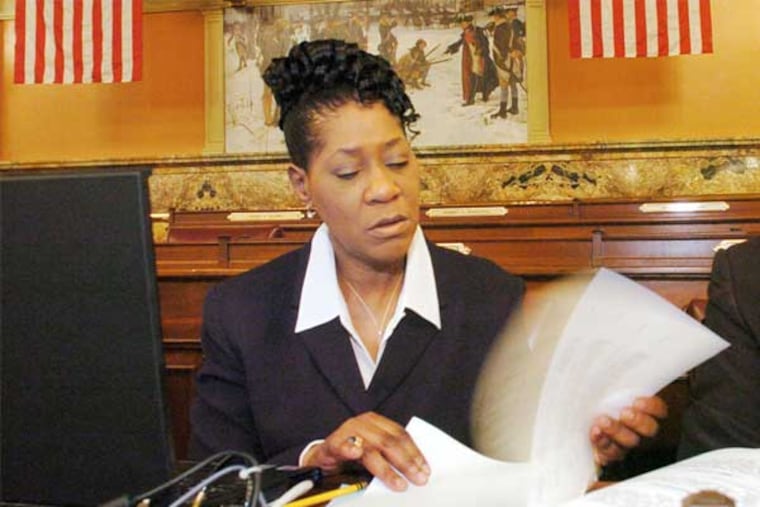Pa. lawmaker seeks to change offensive name of mountain
HARRISBURG - State Rep. Rosita Youngblood (D., Phila.) recalls being stunned when her grade-school-age granddaughter jumped up from a computer to announce that she had found, on a Pennsylvania map, a place called Negro Mountain.

HARRISBURG - State Rep. Rosita Youngblood (D., Phila.) recalls being stunned when her grade-school-age granddaughter jumped up from a computer to announce that she had found, on a Pennsylvania map, a place called Negro Mountain.
"I thought, there couldn't really be a Negro Mountain in Pennsylvania," said Youngblood, who is African American.
But there it was, a 30-mile-ridge in the Alleghenies, 275 miles west of Philadelphia, straddling the Maryland border on the Mason-Dixon Line.
That was in 2007, the year Youngblood launched the first of several attempts to persuade her colleagues in the legislature that it was time to change the mountain's name.
On Friday - feeling more than a little like Sisyphus of Greek mythology - Youngblood announced that she was renewing her campaign to bury a name she feels no longer has a place on the Pennsylvania landscape.
The ridge is said to have been named to honor a slave who died there in 1756, fighting alongside settlers and British during the French and Indian War. His name: Nemesis.
Youngblood said she wanted to recognize his heroism instead of his hue.
"Although the name of Negro Mountain may not directly offend residents of the commonwealth, government officials should take steps to rename the mountain for the man, not the race of the man," Youngblood said.
"I am not looking to rewrite history. Nobody questions that Nemesis was a brave man, and the intent of naming Negro Mountain was to honor his sacrifice. But we live in different times, where we must recognize the person, not label them by the color of their skin."
It turns out that Youngblood, who has served in the House since 1994, has a counterpart in Maryland - she just didn't realize it.
In Annapolis, State Sen. Lisa A. Gladden (D., Baltimore City) proposed legislation to rename her state's portion of Negro Mountain after Nemesis. Until Friday, neither she nor Youngblood knew of the other's equally unsuccessful efforts. ("Oh, my God," said Gladden when told of Youngblood's legislation. "She has the same bill?")
Gladden said her bill "seemed like a no-brainer" but ran into local opposition: "They think I'm an agitator from the city."
In both states, it seems, local opposition to changing the name was, well, rock-solid.
"They said, 'Why do you want to change something that's always been there?' " Youngblood recalled Friday. "Then they asked why a Philadelphia lawmaker was getting involved."
At a 2011 hearing, Gladden got a similar response from other legislators and a crowd from western Maryland.
"They told me Negro was an improvement over its earlier name," she said, referring to a word now all but barred from the national lexicon.
Youngblood said the resolution she planned to reintroduce soon will urge Gov. Corbett to begin the process of renaming the mountain by forming a commission or issuing an executive order. Corbett did not respond Friday to a request for comment. State Rep. Daryl Metcalfe (R., Butler), chairman of the state government committee that would consider the resolution, as well as lawmakers representing Somerset County also could not be reached.
While versions of Nemesis' story differ, all suggest he died defending his white master against a band of American Indians in the fight for what was then the British colonies' western frontier.
That's good reason, Youngblood and Gladden argue, to honor him with the mountain's name. As Gladden put it, "They don't call Mount McKinley 'white man mountain.' "
Erica Armstrong Dunbar, a history professor at the University of Delaware, said the fact that federal officials still deemed the word Negro acceptable as recently as the 2010 census suggests prospects for name changes at the state level are limited.
Nonetheless, said Dunbar, who directs the Program in African American History at the Library Company of Philadelphia, the social forces that have propelled some communities in the Midwest to drop references to squaw in landmark names, for instance, are powerful.
Youngblood said she was hopeful her bill may stand a better chance this time, given that attitudes - as well as the makeup of the legislature - have evolved since she first raised the issue.
By Friday afternoon, Youngblood said, she and Gladden had talked about how to advance the cause on both sides of the mountain by putting together a joint event - perhaps in Harrisburg, or maybe atop Negro Mountain.